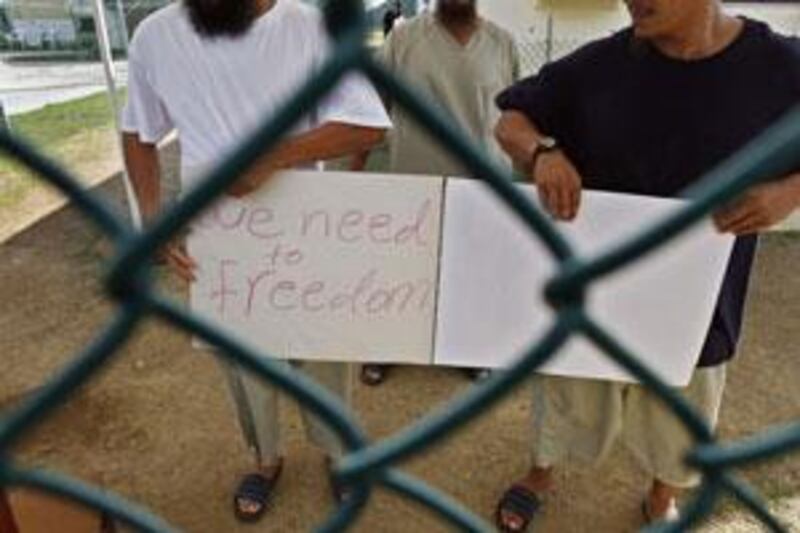Four Uighurs from Guantanamo Bay have been released in Bermuda, but Britain chided its overseas territory saying it should have been consulted on the move. US authorities ignored earlier demands by China for custody of the men, who had served seven years at Guantanamo, and yesterday flew them from Cuba to Bermuda, an Atlantic archipelago that accepted them in a guest-worker programme.
"Growing up under communism, we always dreamed of living in peace and working in free society like this one," Abdul Nasser, speaking on behalf of the four, said in a statement released by their lawyers. "Today you have let freedom ring," the statement said of Bermuda. The Uighurs are a mostly Muslim minority living in China's northwestern Xinjiang province. The latest US State Department human rights report accuses China of having stepped up repression of the community.
The US president Barack Obama is trying to shut down the Guantanamo Bay camp, seen by many as a symbol of excesses in his predecessor George Bush's "war on terror." Bermuda's premier Ewart Brown said the United States would pay for their resettlement. He said the men eventually would be eligible for citizenship, which would allow them to travel elsewhere. But Britain chided Bermuda, a self-governing British overseas territory, saying that it should have first consulted London about whether it was safe to accept the men.
Britain's Bermuda governor Sir Richard Gozney told the territory's Royal Gazette newspaper that the Uighur transfer "was done without permission." "The government of Bermuda should have consulted with us because it carries with it foreign policy ground areas and security issues," Mr Gozney was quoted as saying, adding he was only informed about the move earlier yesterday. In Washington, a state department official acknowledged that the British were livid. He said the United States consulted Britain about the case, although possibly not long before the men boarded the plane.
Bermuda's leader said he felt a responsibility to help the men trapped in a cycle of "tragic events" but who committed no crime. "Those of us in leadership have a common understanding of the need to make tough decisions and to sometimes make them in spite of their unpopularity, simply because it is the right thing to do," Mr Brown said. While US authorities say the Uighurs are some of the several dozen Guantanamo inmates who pose no security threat, US lawmakers cut off funds to resettle them in the United States, saying they could pose a risk.
On Tuesday, US authorities repatriated two other Guantanamo inmates ? an Iraqi sent home to Iraq and an inmate arrested at age 14 who has dual Saudi and Chadian nationality and returned to Chad. The Uighurs presented a unique case. Their home nation ? China ? wanted them back but the United States refused to send them, fearing they would face torture or even execution. The Obama administration could nonetheless be ordered to free remaining Uighurs in the United States if it does not resolve their case before a Supreme Court meeting on June 25.
The US attorney general, Eric Holder, voiced gratitude to Bermuda, a hub of tourism and international finance that is home to some 70,000 people. "By helping accomplish the president's objective of closing Guantanamo, the transfer of these detainees will make America safer," Mr Holder said. A tiny Pacific island country, Palau, has also offered to accept the Uighurs. Palau is among the dwindling number of nations that recognises Taiwan as China's government rather than Beijing.
US-led forces seized 22 Uighurs in Afghanistan after the 2001 invasion that toppled the Taliban and shipped them to Guantanamo Bay, where Washington has sent hundreds of inmates to be held indefinitely without trial. Authorities cleared the Uighurs of wrongdoing and in 2006 sent five to Albania, incurring the wrath of Beijing. Susan Baker Manning, one of two lawyers who accompanied the men to Bermuda, said the United States had a responsibility to free the rest of the Uighurs at Guantanamo.
"If we believe in our constitution and if we believe in the rule of law, we need to do that," she said. Nury Turkel, a Uighur-American lawyer on the men's defence team, saluted Bermuda's "courage" but questioned how men who grew up in the deserts and mountains of Xinjiang would adapt to the sun-kissed, English-speaking isles. *AFP






